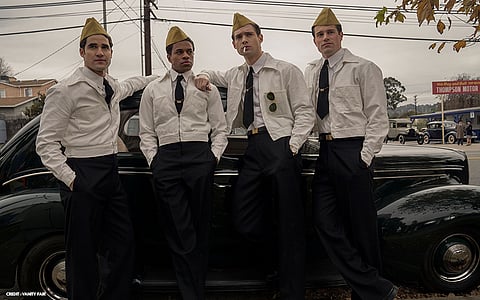
- Reviews
- Power List 2024
- Cannes 2024
- In-Depth Stories
- Web Stories
- News
- FC Lists
- Interviews
- Features
- FC SpecialsFC Specials

Creator: Ryan Murphy, Ian Brennan
Cast: David Corenswet, Darren Criss, Laura Harrier, Joe Mantello, Dylan, McDermott, Jake Picking, Jeremy Pope, Holland Taylor, Samara Weaving, Jim Parsons, Patti LuPone
Streaming Platform: Netflix
There was a notorious meme running around the internet about Netflix adding unnecessary gay characters to its originals. The word unnecessary was taken offence to; what is a "necessary" gay character? Perhaps, one that cannot be interchanged with a straight one? If your sexuality isn't a plot-point, I suppose the meme-maker doesn't quite see the point in it.
Ryan Murphy's seven-part series on Netflix, Hollywood, will perhaps gratify the meme-maker, for here, every character's identity is their plot point, and every situation is them grappling with their identity vis-a-vis success. I must note that there's nothing wrong about this kind of representation, it's just that there's nothing subtle or nuanced about it either.
Hollywood is the story of Ace Studios attempting to make a film that will perhaps change the direction of cinema and race-representation forever. There is a gas station sex-ring in the center of it all. It unfurls the cast of characters in post-World War 2 Los Angeles- many take economic refuge, and some romantic, in moonlighting as sex-workers, while they wait for fate and fame to run its course. The one who wants to become a star finds stability (David Corenswet as Jack Castello, the veteran who wants to "matter"), and the one who wants to have his words crystallized in cinema, finds love (Jeremy Pope as Archie Coleman, the gay black writer who wants to shatter, both stereotypes and the glass ceiling). This gas station is based on Scotty Bowers' own exploits as a Hollywood pimp from the war through the 80s. It's one of the few sprinkles of fact in this largely fictive landscape.
Problems are solved with bland immediacy, nothing feels threatening or irreversible, success is imminent and almost looks easy, and calm. There's no visual impression of labour or ache.
It's a rag tag team. A half-philipino, white-passing man (Darren Criss as Raymond Ainsley) directs a film starring his black lover(Laura Harrier as Camille Washington) and a white veteran, with a Chinese actress and a gay white man (Jake Picking playing a character based on Roy Fitzgerald, a gay Hollywood icon, and the first celebrity to die of AIDS related complications) as supporting actors, in a story written by the aforementioned black gay man, bankrolled by ageing gay men, and old lonely women- all white. It's a celebration of the margins of society. It's not a celebration of Hollywood, but of what it could have been. Much like Once Upon A Time In Hollywood isn't a celebration of its time, but what its time could have been; a celebration of a distortion. There is some fun to be had here.
But this celebration comes from the assumption that cinema can change lives. It's a naive notion that mistakes the validating, entertaining power of cinema for something more profound. The episodes, an hour long each, start with the promise of grit, ambition, sex, and greed. But they taper off into a meditation on representation. It makes sense: to have a black actress play the leading role of a film, when a whole chunk of the country, the American South, is still under the racist claws of Jim Crow, when the violent Ku Klux Klan still fills the annals of power, is to tease the belly of the beast. But the series is so invested in its scruples that it doesn't care for much more. (Like Shubh Mangal Zyada Saavdhan the characters here too are just a little more than their one-line descriptions- gay-black-chinese-woman) It is not longer about how hard they work to achieve success, but how they overcome the rampant racism and homophobia to achieve success. My gripe is- why can't it be both?
As a result towards the end, the last few episodes feel rushed, even the screenwriters just want to get to the end, the shattering success of the underdogs. Problems are solved with bland immediacy, nothing feels threatening or irreversible, success is imminent and almost looks easy, and calm. Every time we see these actors or directors, they are seen lounging, made up, with tea and mascara, woolens and heels. There's no visual impression of labour or ache.
This issue comes blaring in the last episode, that of the Oscars. Every time a person of colour wins, there is their speech, and a cut-to to people of the same community somewhere far off huddled around the radio tearing up at the victory. The problem is not with the staging of the euphoria; I felt ecstatic at every win. The problem was that my ecstacy was not because they worked hard and were finally given their due, but because they were black or gay. My relationship to the character was just that one identifying label. Like one of the characters says when she first sees Archie Coleman, "You're coloured. I love it!" But surely, there must be more.